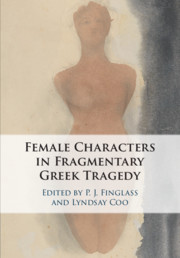Book contents
- Female Characters in Fragmentary Greek Tragedy
- Female Characters in Fragmentary Greek Tragedy
- Copyright page
- Contents
- Notes on Contributors
- Preface
- Abbreviations
- 1 Introduction
- Part I Themes
- 2 Female Violence towards Women and Girls in Greek Tragedy
- 3 Greek Tragedy and the Theatre of Sisterhood
- 4 Women in Love in the Fragmentary Plays of Sophocles
- 5 Heterosexual Bonding in the Fragments of Euripides
- 6 Suffering in Silence
- Part II Plays
- Bibliography
- General Index
- Index of main female characters discussed
4 - Women in Love in the Fragmentary Plays of Sophocles
from Part I - Themes
Published online by Cambridge University Press: 11 June 2020
- Female Characters in Fragmentary Greek Tragedy
- Female Characters in Fragmentary Greek Tragedy
- Copyright page
- Contents
- Notes on Contributors
- Preface
- Abbreviations
- 1 Introduction
- Part I Themes
- 2 Female Violence towards Women and Girls in Greek Tragedy
- 3 Greek Tragedy and the Theatre of Sisterhood
- 4 Women in Love in the Fragmentary Plays of Sophocles
- 5 Heterosexual Bonding in the Fragments of Euripides
- 6 Suffering in Silence
- Part II Plays
- Bibliography
- General Index
- Index of main female characters discussed
Summary
Euripides was lampooned in Aristophanes’ comedies for creating characters such as Phaedra and Stheneboea, married women driven by desire for a man who is not their husband. By contrast, the picture of Sophocles that we glean from the extant tragedies seems to characterise him as a playwright comparatively less interested in depicting female erotic expression and its consequences. This chapter shows that this picture is flawed: in at least three plays – Phaedra, Oenomaus and Women of Colchis – Sophocles did portray ‘women in love’ who experienced sexual desire for a male character and whose actions in pursuit of that desire resulted in the deaths of others. The chapter draws attention to this overlooked aspect of Sophoclean characterisation, and deftly exposes the main differences between the typical Sophoclean and Euripidean models of such women: in Sophocles, none is deliberately betraying a husband, and this may be one reason as to why the playwright appears to have escaped the accusations of immorality and misogyny that comedy heaped upon Euripides.
- Type
- Chapter
- Information
- Female Characters in Fragmentary Greek Tragedy , pp. 62 - 72Publisher: Cambridge University PressPrint publication year: 2020

